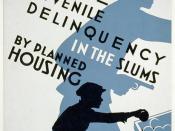Juvenile Justice
The Juvenile Justice System as it typically functions in America's thousands of jurisdictions is the subject that will be covered. The Juvenile Justice System is defined as that 'sociolegal process having responsibility and authority for public reaction to current juvenile delinquency and deterrence of future juvenile delinquency, including within that process the public and private agents, agencies, laws, rules, and policies having to do with juvenile delinquency'(Weiner, 1987, p.12). This paper will deal with the history of the juvenile system, the need for the juvenile system, juvenile court functions, parents in court and programs that have worked, along with ones that haven't.
Because the first formal juvenile court was so labeled on July 1, 1899, which would make the Juvenile Justice System nearly a century old. However, the origins of the various components of the JJS go back much further than that. The notion of separate treatment for children under criminal law goes back to a very early English law.
Children under seven years of age were legally incapable of committing a crime, and children between seven and fourteen were presumed incapable, this concept being based upon a child's inability to have a guilty mind, or mens rea. Thus, from almost the beginning children have been treated differently from adults who commit the same acts.
The origin of juvenile corrections in the United States goes, back at least to the opening of the New York House of Refuge in 1825. This house of refuge was established to meet the same kinds of needs the JJS of today tries to meet, including avoidance of harsh criminal penalties for unfortunate children, segregating 'predeliquent' children from hardened delinquents, providing 'proper' moral, ethical, political, and social values and role models for deprived children, and treating such children as victims rather than offenders.



i like this essay
I found this essay to be very helpful. I don't understand why it got a C-
7 out of 7 people found this comment useful.